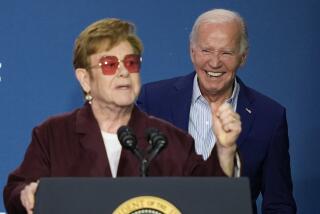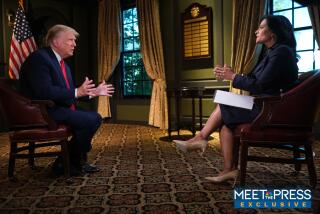White House Offers Support to Beleaguered Senator
WASHINGTON — In the White House’s most extensive public response to the uproar over Sen. Rick Santorum’s recent comments on homosexuality, a spokesman said President Bush views the Pennsylvania Republican as an “inclusive man,” a remark that could help Santorum ride out the controversy.
Press Secretary Ari Fleischer also said that Bush does not concern himself with anyone’s sexual orientation.
Asked for Bush’s view on homosexuality, Fleischer replied: “He doesn’t ask that question about people. He judges people about who they are, their individual soul. That’s not a matter that the president concerns himself with. He judges people for how they act and how they relate, and that’s his focus on that.”
Fleischer’s comments appeared to have two goals. They signaled Bush’s support for the third-ranking Republican senator, who is one of the administration’s staunchest allies and a fervent proponent of social conservatism. But in his remarks on homosexuality, Fleischer also articulated a decidedly less controversial message on what has been a sensitive subject within the GOP.
This week, Associated Press published the transcript of an interview in which Santorum gave his views on the legal and moral issues involving homosexuality and a Texas sodomy law now under challenge before the U.S. Supreme Court.
In the April 7 interview, Santorum linked gay consensual sex to bigamy, polygamy, incest and adultery; asserted that sodomy is “antithetical” to a healthy family and declared: “I have no problem with homosexuality. I have a problem with homosexual acts.”
The comments have drawn a modest level of criticism from Republican centrists and heavy fire from Democrats, gay rights groups and other critics. Some have called for Santorum to quit his position as chairman of the Senate Republican Conference; others have simply demanded an apology.
Santorum, however, has received strong support from social conservative groups who form a core GOP constituency. Buttressed by that support, Santorum has stood by his comments. He also has said he supports equal treatment for all Americans.
Nonetheless, the public backing Santorum received Friday from the White House was critical. Without it, questions might have been raised about whether Santorum had fallen out of favor with Bush, much as did Sen. Trent Lott (R-Miss.) in December following a remark widely viewed as racially divisive.
Bush was among those who criticized the remark and Lott, who weeks earlier had been elected Senate majority leader, was forced to resign that post.
Fleischer on Friday said of Santorum: “The president believes the senator is an inclusive man.” He added: “The president has confidence in Sen. Santorum both as a senator and as a member of the Senate leadership.”
A gay rights group denounced Bush’s expression of support.
“We strongly take issue with the president and his assertion that Sen. Santorum is in any way inclusive of this country’s gay community,” said Elizabeth Birch, executive director of the Human Rights Campaign.
She added: “In his 2000 campaign, the president said he was a ‘uniter, not a divider.’ Sen. Santorum’s remarks are deeply discriminatory and are antithetical to bringing people together. If this is how the president defines inclusion, then it clearly calls into question the depth of compassion in his conservatism.”
On the question of gay rights, Fleischer said Bush believes as a matter of law that “homosexual groups, gay groups should not have special rights or special privileges.”
Fleischer also sidestepped questions on the Texas sodomy law, saying, “That’s a matter for the court to rule on.”
In April 2000, after he had wrapped up his party’s presidential nomination, Bush met in Austin, Texas, with a group of gay and lesbian Republicans. The group had been seeking the meeting for months. After it ended, Bush declared himself “a better person.” But he also stressed his continued opposition to gay marriages.
That year’s Republican National Convention in Philadelphia also heard a brief address from Rep. Jim Kolbe of Arizona, the only openly gay Republican in Congress. That speech was a milestone for the party and was intended to reinforce Bush’s campaign goal of broadening the GOP political base.
As president, Bush has won plaudits from some gay Republicans for other moves they say demonstrate a policy of tolerance and inclusion, including the appointment of an openly gay man to be ambassador to Romania. This year, in another issue of importance to the gay community, the president proposed a major initiative to fight HIV/AIDS worldwide. A bill to implement the initiative is scheduled for House debate next week.
More to Read
Get the L.A. Times Politics newsletter
Deeply reported insights into legislation, politics and policy from Sacramento, Washington and beyond. In your inbox three times per week.
You may occasionally receive promotional content from the Los Angeles Times.










